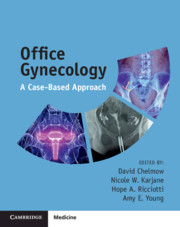Book contents
- Office Gynecology
- Office Gynecology
- Copyright page
- Contents
- Contributors
- Preface
- Section I Pelvic Pain
- Section II Vaginal Discharge and Sexually Transmitted Infections
- Section III Amenorrhea and Abnormal Vaginal Bleeding
- Section IV Contraception and Abortion
- Section V Breast Problems
- Section VI Cancer Screening and Prevention
- Section VII Vulvar Disease
- Section VIII Infertility
- Section IX Preconception Planning
- Section X Pediatric and Adolescent Problems
- Section XI Pelvic Masses and Cysts
- Section XII Incontinence and Prolapse
- Case 80 A 30-Year-Old Woman with Postpartum Flatal and Fecal Incontinence
- Case 81 A 46-Year-Old Woman with Leakage of Urine
- Case 82 A 48-Year-Old Woman with Microscopic Hematuria and Negative Urine Culture
- Case 83 A 55-Year-Old Woman with Urinary Urgency and Negative Urinalysis and Culture
- Case 84 A 30-Year-Old Woman with Frequency, Urgency, Nocturia, and Pressure Relieved by Urination
- Case 85 A 25-Year-Old Woman with Recurrent Urinary Tract Infections
- Case 86 An 80-Year-Old Woman with Total Procidentia with Vaginal Irritation
- Case 87 A 60-Year-Old Woman Presenting with Difficulty with Defecation (Posterior Wall Defect)
- Section XIII Behavioral, Sexual, and Social Health
- Section XIV Managing and Aging
- Index
- References
Case 86 - An 80-Year-Old Woman with Total Procidentia with Vaginal Irritation
from Section XII - Incontinence and Prolapse
Published online by Cambridge University Press: 20 February 2019
- Office Gynecology
- Office Gynecology
- Copyright page
- Contents
- Contributors
- Preface
- Section I Pelvic Pain
- Section II Vaginal Discharge and Sexually Transmitted Infections
- Section III Amenorrhea and Abnormal Vaginal Bleeding
- Section IV Contraception and Abortion
- Section V Breast Problems
- Section VI Cancer Screening and Prevention
- Section VII Vulvar Disease
- Section VIII Infertility
- Section IX Preconception Planning
- Section X Pediatric and Adolescent Problems
- Section XI Pelvic Masses and Cysts
- Section XII Incontinence and Prolapse
- Case 80 A 30-Year-Old Woman with Postpartum Flatal and Fecal Incontinence
- Case 81 A 46-Year-Old Woman with Leakage of Urine
- Case 82 A 48-Year-Old Woman with Microscopic Hematuria and Negative Urine Culture
- Case 83 A 55-Year-Old Woman with Urinary Urgency and Negative Urinalysis and Culture
- Case 84 A 30-Year-Old Woman with Frequency, Urgency, Nocturia, and Pressure Relieved by Urination
- Case 85 A 25-Year-Old Woman with Recurrent Urinary Tract Infections
- Case 86 An 80-Year-Old Woman with Total Procidentia with Vaginal Irritation
- Case 87 A 60-Year-Old Woman Presenting with Difficulty with Defecation (Posterior Wall Defect)
- Section XIII Behavioral, Sexual, and Social Health
- Section XIV Managing and Aging
- Index
- References
- Type
- Chapter
- Information
- Office GynecologyA Case-Based Approach, pp. 272 - 275Publisher: Cambridge University PressPrint publication year: 2019

